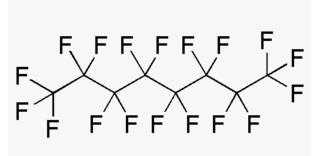
April Fool's Day is seven months away. Otherwise, I'm betting that most of you would write this off as just another joke article. Don't. Since COVID isn't going away anytime soon, mechanical ventilators are in short supply in some areas, and being hooked up to one isn't such a pleasant experience, it would be mighty handy to be able to deliver oxygen to those in need in a simpler (and presumably more pleasant) way.
Dr. Takanori Takebe of Tokyo Medical and Dental University in Toyko and colleagues, using a combination of physiology and chemistry may be onto something. Make that "into something." The group is exploring "enteral ventilation via anus" (EVA) which is pretty much what it sounds like – introducing oxygen into the "wrong" end of the animal aka "butt breathing." This can be done in either of two ways: intra-rectal oxygen O2 gas ventilation (g-EVA, oxygen gas only) or liquid ventilation (l-EVA) with oxygenated perfluorocarbon. I will focus on the latter since this is where chemistry comes in.

Perflourooctane, one of many chemically inert perfluorinated hydrocarbons. When naming this type of chemical, per- means that all of the hydrogen atoms are replaced by fluorine; poly- means that most hydrogens have been replaced by fluorine but some carbon-hydrogen (C-H) bonds remain.
The researchers studied perfluorinated hydrocarbons – alkanes with the hydrogens replaced by fluorine – because of the special properties of these compounds.
- They are chemically inert.
- They dissolve an insane amount of oxygen (PFAS have been researched for decades as artificial blood substitutes, but all have failed.
(BTW, perfluorinated hydrocarbons are part of a larger family of chemicals called PFAS (per-and polyfluoroalkyl substances, which are the so-called "forever chemicals" that are getting so much attention at this time. Why? Because they are inert and don't break down in your body or the environment.)
Although the concept may seem a bit silly, the science is not. This study is the first of its kind where rectal oxygen replacement was tried in mammals. The results are interesting:
- Mice that were deprived of breathable oxygen (put in a chamber with only 10% oxygen) were able to survive (5X longer compared to controls) when given oxygen gas rectally. But the mucus membrane of the intestine forms a barrier against oxygen absorption.
- To overcome this barrier the mice had the intestinal mucus removed by scrubbing, possibly the origin of the term, "I don't think so."
- But when oxygen was dissolved in a perfluoro carrier, mice, rats, and pigs the animals survived significantly longer than controls and no scrubbing was required.
- The animals had no significant adverse effects.
- In humans, the oxygen-saturated perfluorocarbon solution would be administered by enema, which would involve a colonoscopy cleans, which is not trivial in ICU patients.
Below is a graphic showing the process.

Source: Med, Volume 2, Issue 6, May 21, 2021. DOI:https://doi.org/10.1016/j.medj.2021.04.004
“The standard of care is really damaging to native lung function. [After observing his father, who had COVID on a ventilator] I realized we need different ways of respiration support without engaging the native lung”
Dr. Takanori Takebe, The Scientist, May 2021
If you don't like the idea of having a tube shoved up...there... it's a damn sight better than having one down your throat. It is a ghastly experience for many patients who have gone through it. See Awake In The ICU With A Ventilator Tube Shoved Down Your Throat? Thank The DEA.



